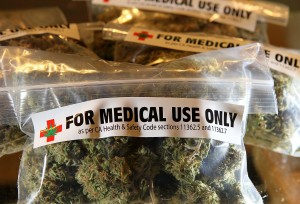As first blogged by The Huffington Post, Barack Obama's interview in Rolling Stone, posted yesterday, includes the president answering a question on a topic that's been the subject of frequent headlines around California recently: the months-long federal crackdown on medical marijuana dispensaries and growers.
Here's the question and Obama's answer, from the magazine:
Let me ask you about the War on Drugs. You vowed in 2008, when you were running for election, that you would not "use Justice Department resources to try and circumvent state laws about medical marijuana." Yet we just ran a story that shows your administration is launching more raids on medical pot than the Bush administration did. What's up with that?
Here's what's up: What I specifically said was that we were not going to prioritize prosecutions of persons who are using medical marijuana. I never made a commitment that somehow we were going to give carte blanche to large-scale producers and operators of marijuana – and the reason is, because it's against federal law.
I can't nullify congressional law. I can't ask the Justice Department to say, "Ignore completely a federal law that's on the books." What I can say is, "Use your prosecutorial discretion and properly prioritize your resources to go after things that are really doing folks damage." As a consequence, there haven't been prosecutions of users of marijuana for medical purposes.
The only tension that's come up – and this gets hyped up a lot – is a murky area where you have large-scale, commercial operations that may supply medical marijuana users, but in some cases may also be supplying recreational users. In that situation, we put the Justice Department in a very difficult place if we're telling them, "This is supposed to be against the law, but we want you to turn the other way."
That's not something we're going to do. I do think it's important and useful to have a broader debate about our drug laws. One of the things we've done over the past three years was to make a sensible change when it came to the disparity in sentencing between crack cocaine and powder cocaine. We've had a discussion about how to focus on treatment, taking a public-health approach to drugs and lessening the overwhelming emphasis on criminal laws as a tool to deal with this issue. I think that's an appropriate debate that we should have.
If that reasoning sounds familiar to followers of this issue, it may be because it's similar to that expressed in comments made by Melinda Haag, the U.S. Attorney for the Northern District of California, who announced with her colleagues last October that they would be targeting medical marijuana dispensaries and growers, plus their landlords. The prosecutors have been true to their words; that's exactly what's happened and is continuing.
In March, KQED's Michael Montgomery sat down with Haag, who for the first time explained her rationale for the amped up enforcement. Some of her language echoes Obama's in the Rolling Stone inteview...or vice-versa.
The reason that the four California U.S. Attorneys announced our efforts together is that we were all experiencing the same thing, which is that everyone was saying we were hearing and everyone was saying the U.S. attorneys are not going to take any actions with respect to marijuana in California because of the 2009 Ogden memo. [Note: The 2009 memo written by Deputy Attorney General David Ogden that laid out enforcement guidelines for federal prosecutors in regard to medical marijuana.] So it's fair game. We can have grow operations, we can have dispensaries, we can do anything we want with respect to marijuana because the Department of Justice in 2009 in the Ogden memo said that the California U.S. attorneys will not take action.
That was incorrect. And we felt that we needed to send a message that it wasn't correct. I actually felt that it was more fair to send a message because, for example, I was hearing from Oakland that it was going to issue licenses and allow large-scale grow operations in warehouses. And what was described to me was that they were going to be quote "Walmart-sized." And I was hearing that everyone believed that would be okay and that my office would not take any action. And I knew it isn't okay, it is a violation of federal law.
When you're talking about that scale grow-operation across the bay in Oakland it wouldn't be something that I could ignore. I didn't think it was fair to stand by, be silent, let people pull licenses in Oakland, put millions of dollars into setting up a grow operation in a warehouse and then come in and take an enforcement action.
Earlier this month, lawmakers from Colorado, Maine, Washington, New Mexico and California -- including Assemblymember Tom Ammiano of San Francisco -- wrote an open letter calling on the federal government "not to interfere with our ability to control and regulate how medical marijuana is grown and distributed. Let us seek clarity rather than chaos. Don’t force patients underground, to fuel the illegal drug market."
